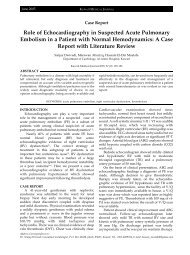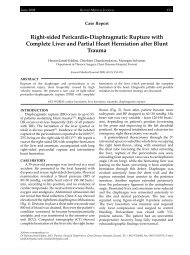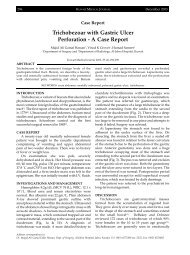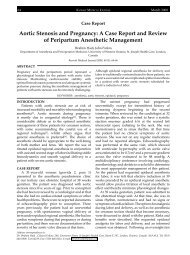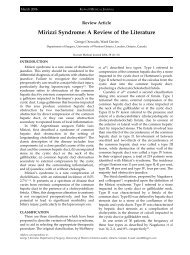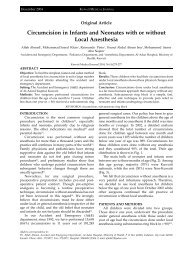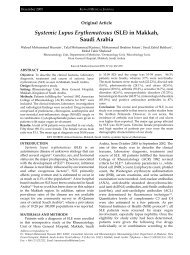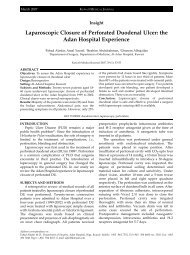<strong>June</strong> <strong>2007</strong>KUWAIT MEDICAL JOURNAL 141encouraging positive behavior and identifyingtreatments .The GPs role includes treating obesityand its emotional and medical consequences [ 24 ] .More than 50% of the physicians were convincedthat obese patients were treated in the asymptomaticpopulation. A study in Te x a s [ 25 ] confirmed thatfamily physicians usually address issues ofnutrition and physical activity in asymptomaticobese adult residents. Then again, this studyshowed that 61% GPs had regular visits by obesepatients and more than 75% of those visits weredifficult to handle. This was confirmed by anotherstudy, where GPs thought that obesity was difficultto be handled in primary care practice [26] .The reasons for the alleged difficulties can beidentified in more depth. Firstly, there was highfailure rate in maintaining ideal weight. Severalstudies showed that success rates in reaching andmaintaining an ideal weight were low [27] . In thesame field, GPs rated that treatments of obesitywere less effective than other chronic diseases [28] .Secondly, there were time constraints. Differentopinion revealed that physicians although theyfaced ‘busy clinical practice settings’ at the primaryc a re clinics nevertheless they succeeded inproviding their patients with a variety of practicestrategies to combat obesity. The key to theirsuccess was based on enlightening each patientwith his or her risk factors. Furthermore, theyrecommended certain diets and encouragedpatients to become active participants in weightloss programs [29] .In reality, the most commonly recommendedtreatments for obesity are the increase of physicalactivities and the reduction in caloric intake. Astudy conducted in the U.S.A. showed that twothirds of physicians provided dietary advice andthree quarters of doctors found that dietary advicewas the responsibility of physicians [30] . In anothers t u d y, 99% of doctors recommended aerobic exerc i s e sand 97% provided dietary counseling [31] . To concur,obesity experts viewed that medications prescribedto obesity patients were less effective and could notreplace diets and exercises [32] . Similarly, this studyshowed that most of GPs preferred not to prescribeanti-obesity medications. Also, this can be due topoor safety profiles of these medications [33] .On the contrary, another study in Korea indicatedthat 68.8% of their physicians prescribed antiobesitymedication without allowing sufficient timefor non-pharmacological therapy to take its effect.This was due to their lack of training on obesitytreatments and management [34] .This study also declared that GPs frequentlyreferred their obese patients to dietitian. This can bedue to lack of time or because patients had beenunder the impression that dietitians provide morehelp than GPs. On the contrary, another studyfinding confirmed that GPs rarely referred obesepatients to health professionals like dieticians forfollow-up or treatment [35] . At the same time, GPs ina different study referred obese individuals whowere in greater need of losing weight or were lessmotivated or were less likely to accept treatmentsbut equally likely to profit from them [36] .As regards to surgical intervention, 94% of theGPs had rarely chosen this as a managementoption. Several studies agreed that surg i c a lp ro c e d u res were underu t i l i z e d [ 37 ] while othersreserved surgical intervention for those with moreserious clinical risks [38] .In Kuwait 86% of doctors did not recommendbehavioral therapy. This could have been due todifferent reasons. First, such therapy option wasnot widely available in Kuwait. Second, there was alack of interest in gaining experience in this field.Third, the therapy was not in agreement withcultural standards. Despite all these reasons, behavioraltherapy has proven positive results. It employedlong term behavior modifications to control impro p e reating habits and behaviors (like eating too rapidlyor eating while watching TV). This study confirmedsuch favorable results and strongly recommendedthis kind of reaction to obesity [<strong>39</strong>] .Only 33% GPs performed active counseling onobese patients. This low percentage could havebeen due to lack of experience or lack of training inthis field. Also, it could be due to the absence ofclear and specific primary care guidelines. Thoseguidelines were available in certain countries. Theresearchers in those countries suggested expandingthem to counsel obese patients. To elaborate, theguidelines must involve weight loss techniques andthe diff e rent ways of improving patient’s complianceand motivation [40] . Others have agreed that someGPs did not provide enough guidelines on weightmanagement strategies due to inadequate counselingskills and confidence [41] .At any rate, as shown clearly in this study,experience was ranked as the most importantcontributor to knowledge concerning managingobesity [42] .In general, several studies suggested that therewas a need for appropriate approaches andpractices toward obesity. In addition, more informationand training must be available to doctors andhealth professionals. This can be accomplished bykeeping up-to- date with related i n f o r m a t i o n .A d d i t i o n a l l y, seeking skills impro v e m e n tand gettingsocial support are highly recommended to makemanagement programs more effective [43] . Anotherstudy concluded that new strategies must be
142General Practitioners’ Attitudes and Practices toward Managing Obesity <strong>June</strong> <strong>2007</strong>c o n s i d e red and implemented like employingobesity specialists at the primary care clinics [44] .CONCLUSIONIn conclusion, this study demonstrated thatmany GPs believed in their essential role inmanaging obesity although 67% of them have facedsome difficulty from time to time. In order too v e rcome that and promote professional fulfillment,several recommendations were suggested by theGPs. First, the media must be involved to educatepeople about risk factors and unwanted consequencesassociated with obesity. Second, about 28.5% of theGPs think that there is an urgent need for morepractical training for them and their nurses. Third,primary care clinics must have professional dietitiansin order to assist and provide on-job-training.Fourth, some suggest establishing a specializedobesity clinic at the level of primary care centersthus minimizing the number of patients visitingGPs. As a result, GPs will be able to provide moretime and better quality of care to their patients.Finally, there is no doubt that early implementationof proposed recommendations could helpGPs to improve the quality of obesity managementand overcome any unexpected difficulties. Conseque n t l y, GPs will be considered as essential inmanaging obesity and in providing better longterm outcome.REFERENCES1. Seidell JC. Epidemiology of obesity. Semin Vasc Med 2005;5:3-14.2. World Health Organization. Obesity: preventing andmanaging the global epidemic. Report of the WHOConsultation on Obesity WHO; Geneva, 1997.3. Prevention and management of the global epidemic ofobesity. Report of the WHO consultation on obesity. WHO;Geneva, 1998.4. Obesity: preventing and managing the global epidemic.Report of WHO consultation. World Health Organ TechRep Ser 2000; 894:1-253.5. Frank A. A multidisciplinary approach to obesitymanagement: the physician’s role and team carealternatives. J Am Diet Assoc 1998; 98:S44-S48.6. Rippe JM, McInnis KJ, Melanson KJ. Physician involvementin the management of obesity as a primary medicalcondition. Obes Res 2001; 9:S302-311.7. Al-Shammari SA, Khoja TA, Al-Maatouq MA, et al. Highp revalence of clinical obesity among Saudi females: aprospective, cross-sectional study in the Riyadh region. JTrop Med Hyg 1994; 97:183-188.8. Al-Mahroos FJ, Al-Roomi KA. Overweight and obesity inthe Arabian Peninsula: an overview. J R Soc Health 1999;119:251-253.9. El-Mugamer IT, Ali Zayat AS, Hossain MM, Pugh RN.Diabetes, obesity and hypertension in urban and ruralpeople of Bedouin origin in the United Arab Emirates. JTrop Med Hyg 1995; 98:407-415.10. Binhemd T, Larbi EB, Absood G. Obesity in primary healthcare centre: a retrospective study. Ann Saudi Med 1991;11:163-166.11. A l - M a h roos FJ, Al-Roomi KA. Obesity Among A d u l tBahraini Population: Impact of Physical Activity A n dEducational Level. Ann Saudi Med 2001; 21:183-187.12. Al-Nuaim Ar, Al-Rubean K, Al-Mazrou Y, Al-Attas O, Al-Daghari N, Khoja R. High Prevalence Of Overweight AndObesity In Saudi Arabia. Int J Obes Relat Metab Disord1996; 20:547-552.13. Al-Isa AN. Are Kuwaitis getting fatter? Nutr Health 2003;17:185-197.14. Orzano AJ, Scott JG . Diagnosis and treatment of obesity inadults: An applied evidence - based review. Am Board FamPract 2004; 17:359-369.15. Clinical guidelines in the Identification, Evaluation, andTreatment of Overweight and Obesity in Adults. NHLBI,1998.16. Kreuter MW, Chheda SG, Bull FC. How does physicianadvice influence patient behavior? Evidence for a primingeffect. Arch Fam Med 2000; 9:426-43317. Simkin-Silverman LR, Wing RR. Management of obesity inprimary care. Obes Res 1997; 5:603-661.18. Wadden TA, Berkowitz RI, Sarwer DB, Prus-wisniewski R,S t e i n b e rg C. Benefits of life style modification in thepharmacological treatment of obesity: A randomized trial.Arch Intern Med 2001; 161:218-227.19. Heath C, Grant W, Marcheni P, Kamps C. Do family physicianstreat obese patients? Clin Res Meth 1993; 25:401-402.20. Judd H. The management of obesity by general practitioners:report of a questionnaire survey. Royal Australian College ofGeneral Practitioners, 1987 Melbourne. J Fam Pract 1998;4 7 : 3 9 - 4 321. Fogelman Y, Vinker S, Lacher J, Biderman A, Itzhak B, KitariE. Managing obesity: a survey of attitudes and practicesamong Israeli primary care physicians. Int J Obes RelatMetab Disord 2002; 26 :1<strong>39</strong>3-1<strong>39</strong>7.22. Kristeller JL, Hoerr RA. Physician attitudes towardmanaging obesity: differences among six specialty groups.Prev Med 1997; 26:542-549.23. Centre for Reviews and Dissemination. The prevention andtreatment of obesity. Eff Health Care 1997; 3:2.24. Aronne LJ. Classification of Obesity and Assessment ofObesity-Related Health Risks. Obes Res 2002; 10:105S-115S.25. Guo JL, Gottleb NH, Smith MM, Huang PP, Huang CM.Nutrition and physical activity counseling practices offamily practice residents. J Cancer Educ 2002; 17:128-137.26. Brotons C, Ciurana R, Pineiro R, Kloppe P, Godycki-CwirkoM, Sammut MR. EUROPREV. Dietary advice in clinicalpractice: the views of general practitioners in Europe. Am JClin Nutr 2003; 77:1048S-1051S.27. Branlage P, Wittchen HV, Pittrow D, Kirch W. Recognitionand management of over weight and obesity in primarycare in Germany. Int J Obes Relat Metab Disord 2004;28:1299-1308.28. Foster GD , Wadden TA, Makris AP, et al. Primary carephysicians’ attitudes about obesity and its treatment. ObesRes 2003; 11:1168-1177.29. Hensrud DD. Tackling obesity in a 15-minute office visit.Physicians can start patients on an effective weight-lossprogram, despite time constraints. Postgrad Med 2004;115:59-61.30. Loomis GA, Connolly KP, Clinch CR, Djuric DA. Attitudesand practices of military family physicians re g a rd i n gobesity. Mil Med 2001; 166:121-125.31. Kushner RF. Barriers to providing nutrition counseling byphysicians: a survey of primary care practitioners. PrevMed 1995; 24:546-552.32. Bray GA, DeLany J. Opinions of obesity experts on thecauses and treatment of obesity—a new survey. Obes Res1995; 3:419S-423S.









